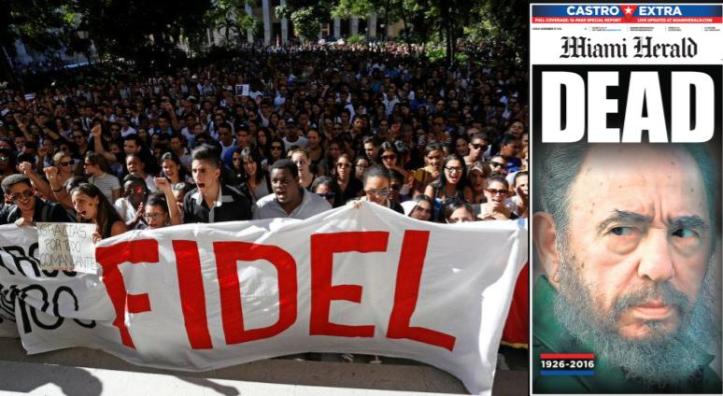Sofia Lesmes is a 1st year international relations and history student at King’s College London.

October 25, 2012. I check my school email to get a notification from the principal: “as rumors continue to circulate on Fidel Castro’s health, I would like to inform you of our school’s plan” meaning that if Castro’s death was announced while school was not in session, it would be cancelled the next day. If school was going on, parents would be allowed to take children home if they wished. As anxiety mounted on this cloudy day, uncertainty loomed in my freshman World History class- as the smallest minority in my old high school was non-Cubans.
With Cubans accounting for 57% of the Latin American population in Miami and 34% (Miami-Dade County 2011) of the total population, it is safe to say that the city’s energy is at the mercy of the Cuban people. There was perhaps no stronger evidence than November 25, 2016 to support this claim. The streets filled with joyous celebration for days on end as the majority of Cuban exiles celebrated not the death of an individual, but a symbolic end. Fidel Castro was responsible for the death, exile, and separation of countless families in Cuba. Born and raised in Miami, Fidel Castro is a taboo name for me, even if I am not Cuban, I know everything he has done and why he is called “the father of modern Miami”. If it would not be for Fidel Castro, I probably wouldn’t know half the people I do because they would likely still be in their home country. Forced to flee, or rather swim and float in makeshift rafts for 90 miles, I am used to hearing stories of how people were saved by the “wet-foot dry-foot policy” and were able to start a new life away from an oppressive system that denied political freedom.
The death of Fidel Castro was met with mixed reaction across the world. “Hasta siempre Comandante” was met with equal amounts of “this is Cuba’s Berlin Wall moment”. However, all of his regime’s glorified political moves and socialist policies mean nothing with his countless human rights violations and disregard for his own people. “The progress on economic, social, and cultural rights was never matched in terms of respect for civil and political rights” (Human Rights Watch 2016). One look at the previously vibrant and moved Havana and all that remains is the crumbled infrastructure of pre-Revolution. For the past 55 years, freedom of expression has basically been unheard of on the island. Anyone who spoke out against Fidel Castro was unquestionably thrown in prison at the very least. Over the past half-century there have been 10,794 deaths by execution and 78,000 have died trying to flee the country (Jeff Goertzen 2016). “For my great-grandmother, who you arrested 12 times for her anti-revolutionary actions and vandalized her house weekly in the search for a hidden weapons cache. For my great Uncle, who you executed for arresting a drunken government official and forced his mother and two sisters to clean up his bloody remains from the execution wall”. People who, like 18 year old David Gonzalez, have never been to their own country, know enough about its history because their daily lives are affected by Castro’s regime.
Personally, I will remember him as someone who put politics and power before his own people. One of the most celebrated cultures of Latin America suppressed by a power hungry extremist. Fidel Castro was one of the leaders of the Cuban revolution against the U.S. backed dictator Fulgencio Batista, but for the Cuban people, the aftermath of this revolution brought about nothing except more pain and suffering. There is the fact that many inhabitants of Cuba support Castro’s regime, and the opinion that only capitalists and/or right wing supporters denounce Fidel Castro because there is little to no free market economy. Or that exiles from Cuba were affluent and only represent those who would not have benefited from socialist policies, unlike its present citizens. However, the question of Castro’s legacy lies in his repressive methods to bring about his goals for the country. So, on November 25th I asked myself, if the eyes of the world were on the largest Cuban community outside of Cuba, shouldn’t that say something? People should look to Cubans who can voice their opinion for a bleak opinion on the Castros’ impact. My hope is that history will do the same.